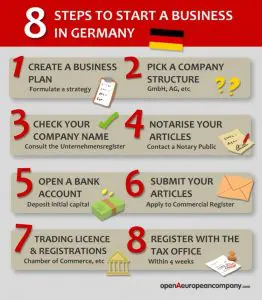It’s not uncommon for business owners and entrepreneurs to expand their ventures into other countries. Expanding your business internationally allows you to tap into a larger customer base and benefit from the larger labor pool there.
More and more companies have begun expanding their businesses to Germany for these very reasons. If you would like to expand your own business to this country, here are some key steps to follow.
Pay Attention to your Business Liabilities
Before attempting to move or expand your business to Germany, it is vital to understand your business’s liabilities. This refers to any debts you may owe third parties. Most businesses take on liabilities when they operate and grow, so this is a common practice.
You should note that some of the liabilities you currently possess in your home country may differ from the ones in Germany. For example, all employers in Germany must follow strict minimum wage guidelines for their staff. Business owners from countries without national minimum wage such as Sweden, Finland, or Denmark should be aware of this prior to setting up their new operations in Germany, or they may face a penalty of €500,000.
Get the Right Licenses
Business owners should also be aware of the different licenses they require to operate in Germany. Depending on the type of business you intend to run in the country, you may need to acquire a special license in the relevant field. For example, protected trades such as recruitment require special licenses that can take time to acquire.
If you already possess qualifications to operate in this field in your home country, you should ensure these qualifications are also valid in Germany. In some cases you may need to meet additional requirements to be able to practice in the country. This may involve taking exams or acquiring certificates.
Check Residence Requirements
If you do not possess German citizenship, you may require a visa or a work permit to be able to run your business in the country. Such visa requirements may differ depending on your home country.
For example, if you belong to another EU nation, you can work in Germany freely and without requiring a visa. If you belong to a non-EU country, you will likely need some form of visa or permit. It is best to check with the German embassy in your country regarding visa requirements before expanding your business.
Understand Company Structures
Prospective business owners and entrepreneurs should have a firm understanding of their company structure or “rechtsformen” in Germany. The country recognizes the following business types:
- One-person businesses or Einzelunternehmen
- Partnership businesses or Personengesellschaften
- Corporations or Kapitalgesellschaften
One-Person Business
A one-person business is typically founded by a single individual, such as a freelancer. They are usually liable for their company’s debts.
Partnership Business
Germany defines partnership businesses as those that are founded by a minimum or two people or organizations. These partners possess unlimited personal liability for their business debts. The only exception occurs in the case of limited partnerships.
Partnership businesses can be broken down into the following subcategories:
- Limited Partnerships
- Civil Law Partnerships
- Limited Partnership and Company Limited Partnership
- General Commercial Partnership
- Partnership Company
Corporations
In Germany, corporations are defined as entities founded by anywhere from one to five people. Setting up a corporation typically requires capital. However, this business structure can protect the founders’ personal assets from any business debts they incur.
Business owners and entrepreneurs will need to state their company type when attempting to register their business in Germany. They should look into each of the types mentioned above before making their decision, as it may have wide-reaching impacts on their business.
Preparing Documents and Finances
Prospective business owners and entrepreneurs should also familiarize themselves with the various documents they require when forming their German business. Key documents such as the Articles of Association and Memorandumof Association must be attested by the local trade office. You will also be required to disclose your business’s management structure and also your share of capital in the business.
If you intend to set up a limited liability company in Germany, you will need to provide a minimum capital share of €25,000. However, you can also meet this requirement by depositing €12,500 into a bank account at the time of registration.
Complete Your Registration
Next, you will need to register with German authorities. This registration process can be somewhat complicated, and may involve registering locally as well as in-person for certain business types.
Many business owners and entrepreneurs seek out company formation specialists to help them with this task. Such specialists are familiar with the registration process and can ensure your company meets all the requirements.
Launching and Promoting Your Business
With the registration complete, the next steps are to launch and promote your business in Germany.
Promotion is especially crucial for the success of any business, so you should focus on doing this in the months leading up to your business’s launch in Germany. Remember that success in your home country does not necessarily equate to success in Germany, so you should spend some time refining your market strategy. Read about the advantages and disadvantages of international business expansion.
Getting Professional Assistance
Business owners and entrepreneurs who wish to expand their business to Germany can make this process easier by hiring company formation specialists such as Open European Company. We can help you set up subsidiaries, branches, and stand-alone companies in Germany or multiple countries, and ensure your business meets all legal requirements. Please get in touch with us to learn more about our services or to speak with one of our company formation experts.
Read about starting a company in Germany: the ultimate guide







